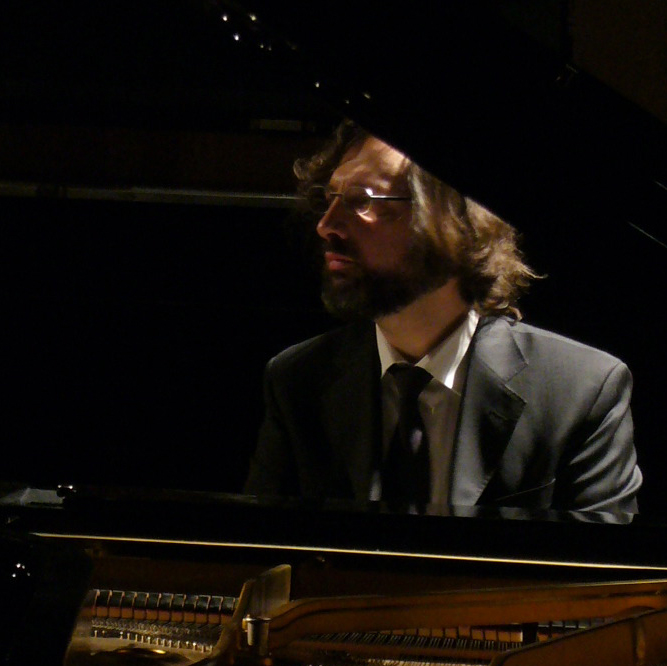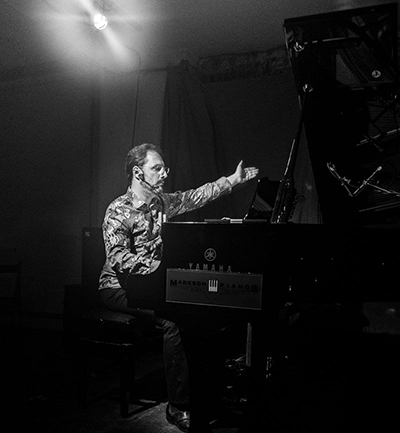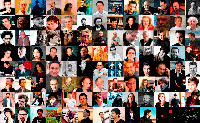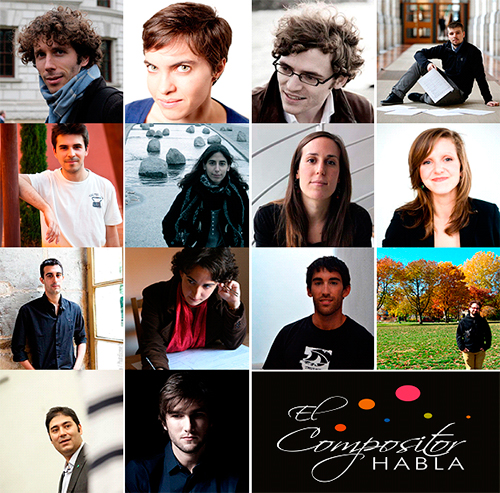Entrevistas
Stephane Ginsburgh | The sound is the identity of a piece of music
11/05/2016
Stephane Ginsburgh | The sound is the identity of a piece of music
Ruth Prieto, for ComposerSpeaks, interviews pianist Stephane Ginsburgh
Ruth Prieto, for ComposerSpeaks, interviews pianist Stephane Ginsburgh
What inspires me as a musician is music of course. Any music. But, ultimately, I don’ really know what inspiration is. I would see things more in terms of aspiration, motivation or drive than in terms of inspiration … inspiration for me is something quite difficult to describe. I would say more exploration, the drive to do something new. |
 |
1. Ruth Prieto: Who is Stephane Ginsburgh?
Stephane Ginsburgh: Oh my God what a question …. Very difficult to answer. Well Stephane Ginsburgh is my name but behind the name there are probably many things, like all of us. We are multiple human beings, artists. But I am not very interested in knowing who I am. I am not going to try to define myself in a few sentences.
I am a musician. That’s a big part of my life and I try to be as open as possible as a musician, which means I am interested in many new things but also I am interested in things like science, mathematics, literature, and I try to bring all these things together and I suppose that all these things make me what I am as an artist. I am also the son of my parents so that has to be about where I come from, and, of course, if you know where you come from there is no limit to where you can go. And of course I am a father, a very big part of my life to which I have devoted a lot of time and a lot of energy.
2. R.P.: What’s left of the child who began his musical studies in Belgium?
Stephane Ginsburgh: I would say that the personality you are is always made of the people you encounter. Some make not a big impression, some make a bad impression and some make a good impression, impression in the sense of imprint ... something deep. But, after so long, I would say that the people who make a bad impression on me do not have a negative impact. Actually, sometimes it is positive because you have to find a way out of the thing you don’t like.
And also from my student years I would say: Bartok. It’s something that I’ve kept with me since childhood. I play his music a lot, I listen to his music and I continue playing his music and being inspired by him as a human being.
3. R.P.: Which characteristic defines you best?
Stephane Ginsburgh: I would say an open mind, being open-minded, I’m curious. It’s important to be curious ... not to enclose yourself in one thing. Of course you have to find yourself too. So it’s a balance between being curious and open to everything and then finding out who you are, what you can do, your possibilities and your limits and not going beyond your own limits. So it’s a balance.
4. R.P.: What inspires you as an artist and why?
Stephane Ginsburgh: Everything. First of all, what inspires me as a musician is music of course. Any music. But, ultimately, I don’ really know what inspiration is. I would see things more in terms of aspiration, motivation or drive than in terms of inspiration … inspiration for me is something quite difficult to describe. I would say more exploration, the drive to do something new. I like to explore new territories. Maybe it’s about “conquering” - not conquering in order to own more but rather conquering to discover yourself. I like to conquer, I like to discover, I like to be part of a new experience. And then go deep into things… go and come back… there are things to which I like to come back like Bartok, Beethoven, Spinoza… I do not plan. I just come back like that….or at people’s suggestions. For example, with Fabian Fiorini I rediscovered Bach. We share a project about Bach.
5. R.P.: What are your musical roots, real or imaginary?
Stephane Ginsburgh: As I said, Bartok. My roots are mainly in eastern European classical music, German music probably more than French music and, yes, classical music and modern music. I love the music of the 19th Century but I don’t really consider it to be part of my roots as such.
When I was a kid, I listened to a lot of rock music and to the music of the seventies but I would not say that I am influenced by that either although I feel very close to the progressive rock movement despite never having played in a band or anything like that.
Just as Bartok made a bridge between Hungarian folk music and the classical tradition, I think that progressive rock music has made a bridge between the music of its time (rock and jazz) and classical music….experimentation, exploration… exploration of the suicidal kind because, at the end of the day, the pieces are impossible, impossible to play, impossible to record, very complex to be commercialized, impossible to sell…but I like that.
6. R.P.: In this personal "inventory" that we all have of noises, sounds, music and songs, what can you tell us about your soundscape?
Stephane Ginsburgh: I love the sound of nature, wind, birds…but I was born in the city and I live in the city so the sound of the city is there although I come back to the forest for the natural sounds.
When I was a child, I used to listen to the music that my parents played at home. When you are a child you don’t choose music. You just listen to what is at home. My mother listened to a lot of piano music, mainly classical music played by Glenn Gould, Claudio Arrau, Arturo Benedetti Michelangeli, Rubinstein, Pollini, Richter and others, but also a bit of more modern music - Schonberg, Bartok, Prokofiev and similar. My father was always more attracted to singing, opera… lots of French songs and rock music…so it’s very wide, I feel lucky.
7. R.P.: What does silence sound like?
Stephane Ginsburgh: Maybe silence is what you get in these specially prepared rooms but real silence doesn’t exist in real life. In my case, I am very sensitive to silence. I can hear very soft sounds. I must say that I don’t find the silence I would like to find in the city. Noise is everywhere. I really have to make an effort not to hear noise.
You can get accustomed to the sounds you hear...you always hear something so silence always sounds like something.
8. R.P.: Have you got a composer of reference or someone who made a special impression on you as a pianist, as an artist?
Stephane Ginsburgh: Many. It’s very difficult to answer, above all when I work with them and their music. It’s difficult to make a hierarchy. I try to love their work when I work with them but it’s better not to make a list of that. Stockhausen for me is very important. Discovering Morton Feldman meant focusing much less on the traditional score and much more on sound and on the importance of sound. With Stockhausen everything revolves around sound. All his music is built around sound and based on sound. This was a very important discovery for me. Then you come back to the old composers you know and you understand them better. Sometimes the wonderful thing of contemporary music is that you can rediscover the old classics again in a new way. You have to experience new music also in order to understand old music and also this is the only way to keep old music alive. You have to rethink the music. To do something new from something old. 27, 50
9. R.P.: Can you define contemporary? And, in which way Stephane Ginsburgh is contemporary?
Stephane Ginsburgh: We are contemporary because contemporary is today. For me it is as simple as that. A question of time, only a question of time. So Stockhausen is not contemporary anymore because he’s dead. But, of course, he’s recent, XX century. However, “contemporary” as such is very limited because it is confined to what we do now.
But of course the way in which you perform music, the way in which you consider music, can be contemporary. Bach or Beethoven can be contemporary in the way in which you rethink and perform their music. It is somehow keeping that music alive as if it were still music of today that makes it contemporary. But of course it is not contemporary music in the sense of how music is catalogued or classified by musicologists. |
 |
There are some issues with contemporary music, the issue of tonality, the issue of understanding or of what you think you understand. Adorno said that when you don’t understand in Schoenberg you don’t understand in Beethoven. This is not a good argument because it is only the superficial part, the part of the tonality or the things that can make this music more familiar. What we know is a problem with contemporary music could also be a problem of understanding with other kinds of music. Bartok had his problem of ‘understanding’ back in his time. And when Beethoven wrote some of his quartets, he was very contemporary: people did not like it, musicians did not like it and performers complained about it.
10. R.P.: Do you think that is necessary to understand always what you listen?
Stephane Ginsburgh: Absolutely not necessary. It is a question of listening. It is a question of giving your concentration a chance and of trusting the music you are listening to. If you want to be listened to as a composer you need to have the attention of your audience. If you do not have their attention, it is very hard. It is important go into the music and take time... sit down in the right conditions, listen to it, not only once but more times if possible… otherwise you only write for the people that understand and not worry about the rest.
11. R.P.: What is your DNA as a pianist?
Stephane Ginsburgh: I think there are things that I am looking for when I play a piece of music. The sound, look for a special sound, everything is in the sound for me. It is not only about making a ”beautiful sound”. The sound is the identity of a piece of music. The sound is part of the musical form. I always say when a sculptor is doing a sculpture, he works on a material: wood, stone, etc.… and he shapes it. For musicians, it is the same. We work with a material, sound, and we shape it. You have to consider shaping the sound because this is your material. Unity is also very important for me ... unity in a piece of music.
12. R.P.: What is your main obsession as a pianist when working?
Stephane Ginsburgh: Sound but in relation to gesture. Learning to play the piano is learning to perform not only theoretically but by doing…knowing what movement, what gesture you have to make to produce a special sound. It’s not quantifiable. It goes through your body, the experience of your body and the memory of your body. That’s what I am doing when I practice: making sure that the body does what it needs to do to connect with the sound and the music. So the score is also at the centre.
13. R.P.: How do you go about putting together a new work, could you describe your creative process?
Stephane Ginsburgh: It is always a difficult question above all if you are a performer, an improviser and sometimes creator… I learn from scores and I try to understand what is written there. This is basic in order to accomplish the work.
14. R.P.: What has your greatest extravagance been?
Stephane Ginsburgh: This is a question of reference. I try to be open-minded so for me nothing is extravagant….everything is possible. I have played naked, which could it be considered extravagant but I was not the first to do that. Or when I explore the repertoire of Speaking Pianist, I work in a way that some people could find extravagant but again other people have done this before me. Sometimes people think that something is extravagant because it is strange or not common, such as playing and talking at the same time. Maybe that impresses people…maybe it is extravagant because it is outside the boundaries usually considered normal in classical performance ... but it’s ok.
15. R.P.: What does music contribute to education?
Stephane Ginsburgh: We are in a difficult situation at the moment because in a lot of countries we are fighting against people who want to make the world efficient economically-speaking and who want to get rid of all the things that they consider inefficient economically-speaking. And they want to sabotage. They can tell you: if you want to do this then do it but without help from the government. They are pushing hard and do not say anything clear because they present themselves as people who care about the collectivity and who take care of public resources but we know that it is not the case because there is a robbery going on, things that should be shared are not shared as they should be and the difference between the rich and the poor gets bigger and bigger. The first victims of that are education, welfare, heath, culture and the arts – the very things that most people should benefit from.Music is important not only in a utilitarian way. Music uses qualities in human beings that very few activities use at the same time: your intelligence, motricity, sensitivity, emotions, etc. The benefits of music are wide and it takes time. In life, knowing how to be patient is very important. Music teaches you this.
16. R.P.: What would you like to do as a pianist that you have not been asked to do yet?
Stephane Ginsburgh: I am pretty happy in terms of what I do. I consider myself quite lucky. I have paid the price to be independent. But it’s difficult to remain independent. You have the tendency to do things in a circle and, after a certain time, you return to previous things. But I am lucky. I do mostly what I like to do. There are a lot of things that I would like to do in the future, things that I want to explore. I will do them.
17. R.P.: What are your next projects?
Stephane Ginsburgh: One is a project with Stefan Prins, a Belgian composer who has been working on a series of pieces called ‘Piano Hero’. It is a performance which involves the pianist not only as a pianist but in interaction with image. It’s a very rich piece and I like his universe a lot. He’s very interested in technology not only as a tool for his music but as something human beings can interact with. I am very excited.
I am also working with the composer Christophe Guiraud. He’s writing a piece and I like his poetic universe, I like his scores. They look like Leonardo da Vinci paintings.
And I have a lot of work with my “Speaking Pianist”. I have several performances of this, one with works by Frederic Rzewski. The “Speaking Pianist” makes me realize that things like a special communication between music and you is very iconoclast. And I also have my project with Prokofiev.
18. R.P.: How do you see the contemporary music scene today?
Stephane Ginsburgh: It is not easy. There are a lot of good things. There is so much going on that it is difficult to know everything.Sometimes I am so busy that I am completely focused on the composer I am studying or exploring at that particular moment. I wish I had more time.
Brussels, March, 2016
Biblioteca
Destacamos ...
Nueva Sección Directorio
dedicada a la promoción de compositores, intérpretes, instituciones y editoriales.

dedicada a la promoción de compositores, intérpretes, instituciones y editoriales.



